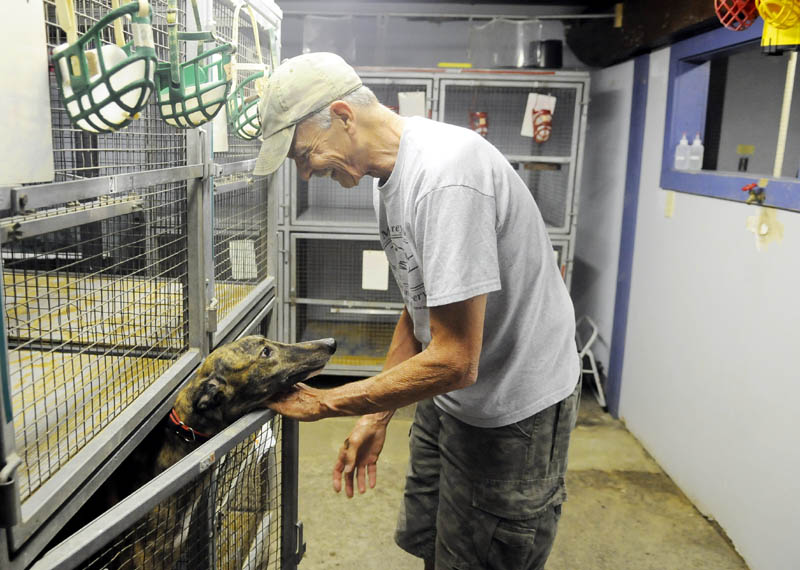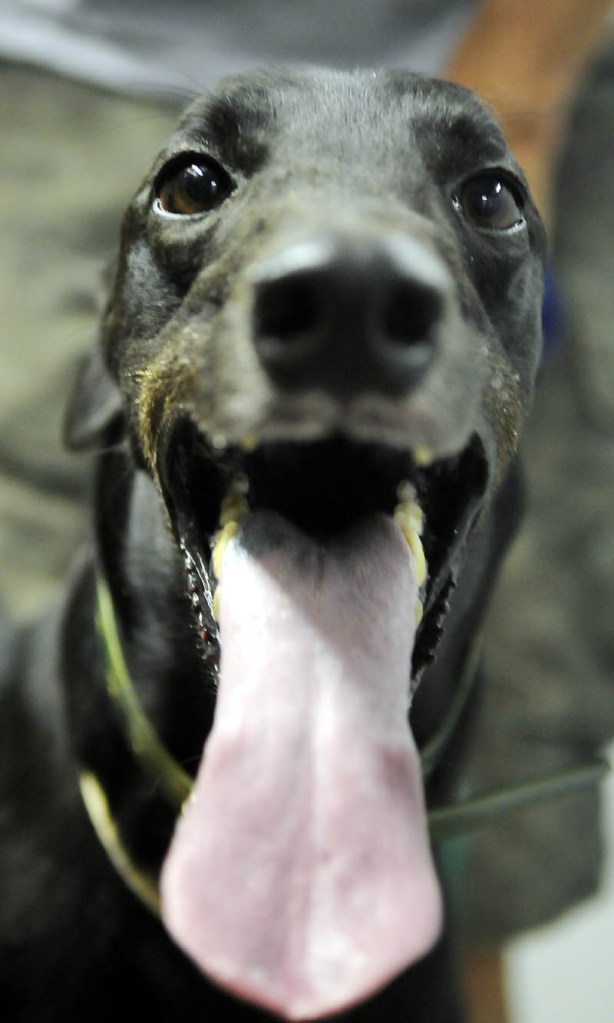AUGUSTA — A couple of decades ago, when the racing careers of greyhound dogs like Dancer, Patch, Tomato and Jimmy came to an end, it often meant their lives did, too.
In some cases, the end came by being shot in a field, with the ears cut off so the identifying tattoos inside them couldn’t be used to trace the owners.
Now, these “45-mile-an-hour couch potatoes” are taken in by rescue organizations such as Maine Greyhound Placement Service in Augusta, where they are matched up with people to give them their first taste of what it’s like to be a pet, in a real, loving home.
“Things have changed a lot,” said Mary Towle, treasurer, placement representative and co-founder of the Augusta rescue group. “Most of the racing kennels now focus on getting dogs no longer profitable into a rescue group. Before, they were in various ways euthanized. There are still some that are. But those situations are getting fewer and fewer. The public is too aware, at this point.”
Saturday, the Maine Greyhound Placement Service expects a truckload of 12 newly retired racing greyhounds to arrive from Birmingham, Ala.
Waiting to greet them are 20 adoptable greyhounds already at the shelter — including the aforementioned Jimmy, a large, sinewy black hound retired from a Florida dog track who, on a recent afternoon, was let off leash in the Augusta kennel’s large fenced-in area for a run with his fawn-colored friend Felix.
The two greyhounds, members of a breed capable of accelerating to 45 miles per hour in just three strides, briefly tore around the field at blurrying speeds.
Then, after just a minute or so, both stopped and wandered over, breathing heavily, to a group of people talking in the corner of the field, and leaned on them, looking for some attention.
“They’re such gentle dogs,” said Louise Sawyer, kennel manager and veterinary technician for the nonprofit rescue organization. “People think they need a lot of exercise, but they don’t. They’re sprinters. Even when they were on the track, they’d only run for 28 or 29 seconds, then they’re done.
“They’re really kind of lazy hounds. They enjoy their retirement.”
Sawyer said the retired racers are generally quiet and clean, good with kids and other dogs, and are also good pets for senior citizens and people living in apartments.
But because they’ve never been outside a racetrack setting, the dogs need time to adapt to their new, better lives — though Sawyer said they adapt very quickly to their new surroundings.
Most have never climbed stairs, walked in snow, or lived in a home with things such as ringing telephones.
“They’ve had a very regimented life, nothing warm and fuzzy,” Sawyer said. “Some have to be trained to even take a treat from you. They’ve just never had that interaction.”
Towle said adopters must have a crate for their new pets, as a secure place to put the animal as it learns how to live in a house.
Special concerns that come with the dogs include a requirement, Sawyer and Towle said, they either be on a leash or within a fenced-in area.
As sight hounds, they may instinctively run after something that catches their eye. And because they’re so fast, if they do run, you’re not going to be able to catch them.
Sawyer said the ex-racers can be prone to problems with their teeth, as they’ve received little or no dental care and, until they come to the shelter and are put on a dry dog food diet, many ate nothing but raw meat.
They need coats in the winter because they are not good at dealing with temperature extremes.
Maine Greyhound Placement Service charges adoption fees of $175 for males, $225 for females, a fee that doesn’t come close to covering the cost of taking in and caring for the svelte, multicolored creatures.
Those interested in adopting from the shelter start by calling 846-4707 to see if they and a greyhound would be a good fit for each other. If so, they’ll get an appointment with Scott Bruns, co-founder and president of the organization, who can show potential adopters greyhounds. Visits to the shelter are by appointment only.
Next door to the kennels on Old Belgrade Road in a deteriorated forward dairy barn, a large three-story barn-like structure that will serve as the new shelter is under construction.
Fundraising to help pay for the $200,000 shelter is ongoing. Donations may be mailed to the Maine Greyhound Placement Service, at 231 Old Belgrade Road.
Sawyer anticipates the building will be ready for the dogs to move there in October, with completion of the rest to follow. Ultimately it will have space for not just kennels, but also training and meeting areas, and a store selling greyhound-related items like coats.
The shelter also has a veterinary clinic onsite, in a separate building, where a veterinarian comes occasionally to help care for the animals, and where the greyhounds are spayed or neutered before they are adopted.
By law, greyhounds can only race until they’re five years old. Only six states still allow dog racing. All of the Augusta dogs come from southern racetracks, mostly from Florida and Alabama.
Up until a couple of years ago, there were tracks as close as New Hampshire, but the practice has since been outlawed there.
Maine has never had dog racing. So why does Maine have a greyhound shelter?
Towle explained there are greyhound rescues across the country because, as the areas immediately surrounding the tracks become saturated with retired racing dogs, a wider range is needed to be able to find homes for adoption.
Bruns started the Maine Greyhound Placement Service in 1993, first just adopting a dog himself, then growing to become the nonprofit rescue organization it is today. It moved from Bridgeton to Augusta in 2003, to be more centrally located and have easy access to Interstate 95.
The service has two paid staff members, some 25 kennel volunteers, and others helping raise money and awareness across the state.
Their motivation — the dogs.
“Working with these guys as they’re coming off the truck, getting their first taste of a real pet life, I can’t imagine anything more rewarding than that,” Sawyer said. “It’s almost a religious experience. The feeling you get — there’s no pill that can do that.”
Keith Edwards — 621-5647
kedwards@centralmaine.com
Send questions/comments to the editors.




